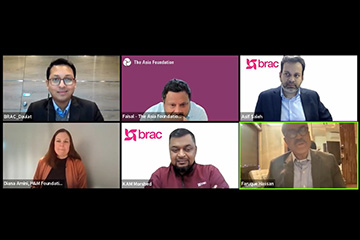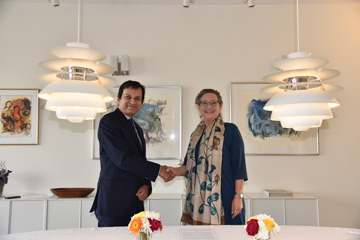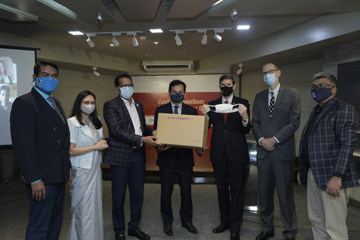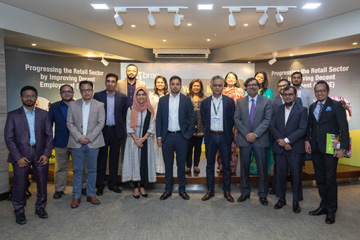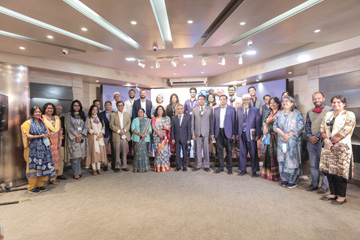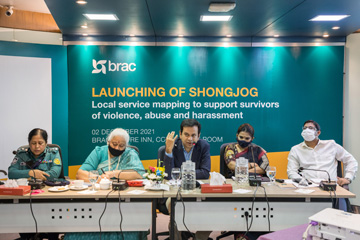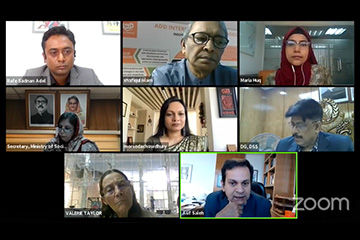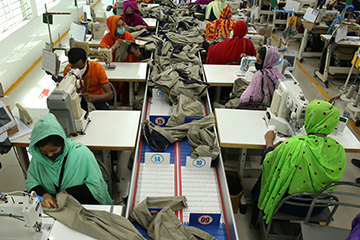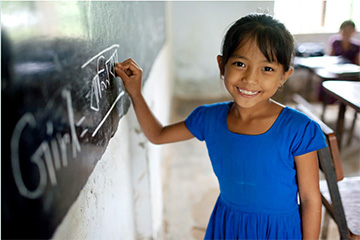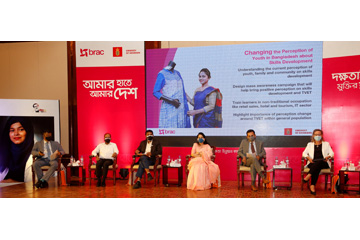
BRAC
STITCH For RMG Global Innovation Challenge announces winners
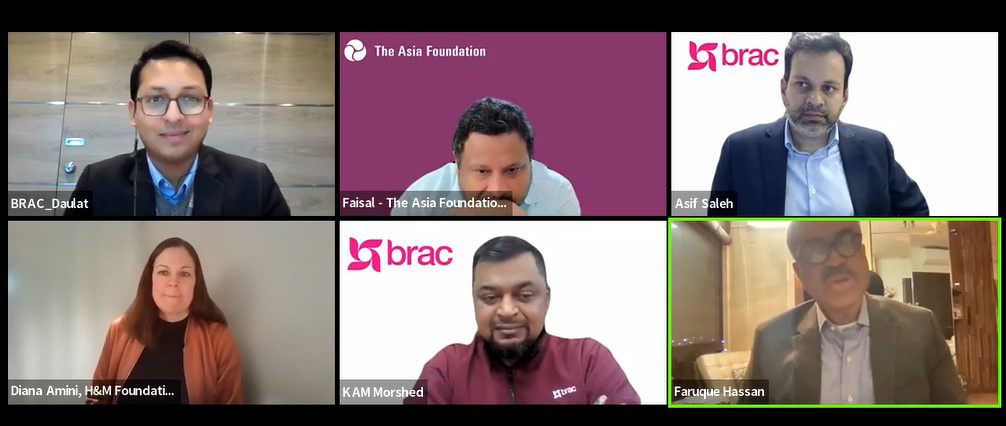
Promoting innovations to transform the lives of women in RMG industry
BRAC, H&M Foundation, and The Asia Foundation have announced the six winners of the international competition titled “STITCH for RMG: Global Innovation Challenge”. The announcement was made last evening (Tuesday, 7 February 2022) at a virtual event organised by BRAC Social Innovation Lab, H&M Foundation, and The Asia Foundation.
The global competition was launched October last year (2021) to promote improved livelihood opportunities for the women working at the export-oriented readymade garment factories in Bangladesh, promote gender equality at the factory floors and increase factory performance.
The six winning teams of the competition are: Agroshift, iSmart, Jyoti, Quizrr, Sustify and ToguMogu. Faruque Hassan, president, BGMEA, Asif Saleh, executive director, BRAC, and Diana Amini, global manager, H&M Foundation, and Kazi Faisal Bin Seraj, country representative, The Asia Foundation, congratulated the winners.
Diana Amini, GM, H&M Foundation, said, ”I think we all have different roles to play, and for us, representing the philanthropic sector, our role is to be able to support early-stage ideas, methods, innovations, and also to be able to take risks that other actors cannot. And together with our partners, we can also co-create and validate solutions and invite others to play a part in helping us scale them.”
Asif Saleh, ED, BRAC, said, “Unlike how it is perceived elsewhere, we looked at innovation that is not necessarily driven by products, it can be about processes, it can be about simple solutions, and particularly, simplicity is the key toward scaling.”
Kazi Faisal Bin Seraj, CR, The Asia Foundation, said, “The thing that stood out for me in the pitches is that all the applicants used empathy to create their solution, that it is not just technology, rather how it is more appropriate in a context, in a gender sensitive manner. I think that empathy can be seen in all the programmes, in the global nature of it and the innovative nature of it”
Faruque Hassan, president, BGMEA, said, “We need more attention and investment in innovation, from businesses and state level, to upscale our capability and adaption. Global buyers are looking for sustainable manufacturing sources which resource efficient, without technology, optimum use of water, energy, and other resources cannot be ensured. So, we need to ensure 4th generation of technology in our supply chain.”
A member of team Quizrr said on behalf of the winners, “We look forward to new collaborations through this network. We want to learn from each other, so we can further accelerate our solutions and provide better innovations to this industry and its workforce.”
The awards for the winning teams come with grants up to USD 30,000 to pilot the solutions. The winners also will have opportunities for bootcamp training with mentors, incubators, and accelerators.
The solution focus of the winning teams are as follows.
- Agroshift is creating demand driven digital grocery platform for RMG workers;
- i-SMART is developing a standardized skill matrix for women sewing workers;
- Jyoti is removing the barriers of access to sanitary pads for RMG factory workers improving menstrual hygiene;
- Quizrr is building female RMG role models through skill and leadership development training;
- Sustify is building capacity through gamified microlearning for female factory workers in Bangladesh; and
- ToguMogu is supporting female RMG workers through a health and wellbeing platform making their parenthood stress-free.
The competition started with a “concept round” in which 220 applications were received and 50 applications were shortlisted for video submissions in the “pitching round”. A total of 12 teams won to move to the final round that organised a virtual marketplace, offering opportunities to partner with RMG factories. Through a tough competition the winning teams secured opportunities to incubate their projects in these factories that had volunteered to provide time, space, and other resources for the purpose.
The Marketplace Round was a unique opportunity for the competitors both from Bangladesh and beyond to discuss their ideas with factory owners and representatives, through which they were able to understand the probable demand and feasibility of their solutions on the ground. It was a matchmaking process where the factory owners jointly showed interest in developing the business together with the team they got matched with.
The competing ideas and solutions covered a range of themes from health, to skill development, security, sustainability and others. In total nine teams moved forward with factories based on the overall practicality of their solution. Of them, six teams topped the competition.
The “STITCH for RMG: Global Innovation Challenge” is part of the STITCH for RMG pilot project undertaken by BRAC, H&M Foundation and The Asia Foundation. The goal of the project is to create an environment that advances welfare and livelihood of the women in ready-made garments sector of Bangladesh as well as boost Bangladesh’s performance in the RMG industry.
BRAC, Embassy of Denmark sign MoU to implement rainwater harvesting project in Mongla
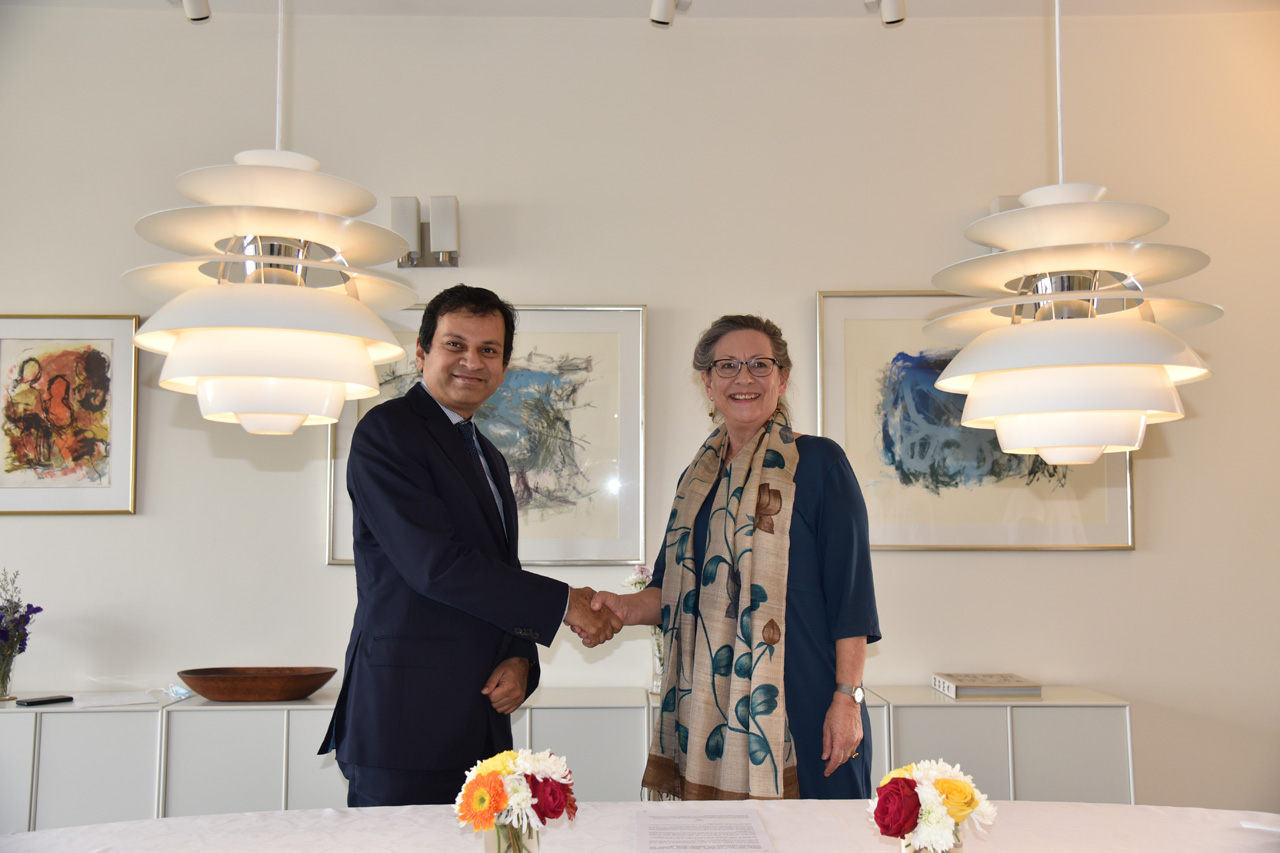
BRAC signed a memorandum of understanding with the Embassy of Denmark (EoD) in Bangladesh this morning (Thursday, 27 January) at the Danish ambassador's residence to implement a project titled ‘Enhancing Safe Drinking Water Security and Climate Resilience through Rainwater Harvesting’ in Mongla Upazila of Bagerhat District. The Danish embassy in Bangladesh will provide the total budget of the project at 29 million DKK over three years of project period to reach 67,300 climate vulnerable people with access to safe drinking water.
Mongla is one of the most climate-vulnerable areas in Bangladesh, particularly in terms of salinity intrusion. More than 60% of its inhabitants have no access to safe drinking water and are suffering from health and income loss. Women and girls are disproportionately affected due to the overburden of domestic work and social insecurity.
Winnie Estrup Petersen, ambassador of Denmark to Bangladesh, said at the signing ceremony, “We are very happy to take this step to deliver on the talks of COP 26. By 2023, Denmark will provide at least 500 million USD per year globally in grant-based climate finance. Bangladesh is amongst the world’s most climate vulnerable countries and should of course benefit from our strong climate commitment. This partnership signals first of several Danish commitments to climate adaptation and mitigation programmes for Bangladesh starting 2022.”
Highlighting the importance of adapting climate-adaptive measures for the people of the coastal belt of Bangladesh, Asif Saleh, executive director of BRAC said on the occasion, "No one should walk 2 km to fetch drinking water. However, climate change is driving an acute drinking water crisis in coastal Bangladesh. BRAC has been working persistently to ensure this basic human right of getting safe drinking water. We appreciate very much the support of the Embassy of Denmark in this endeavor. Together we will work towards developing a holistic and sustainable model of providing water at the last mile for every single Bangladeshi."
The project’s goal is to improve the wellbeing of the most climate-vulnerable population of the upazila by creating access to a nearby source of safe drinking water, a solution which can be replicated in other similar localities. In line with the Danish Development Strategy “The World We Share”, the project will enhance climate resilience following a community-centric locally-led approach, while coordinating with the government and other non-governmental actors.
BRAC receives 56 million cloth masks From US multinational Hanesbrands
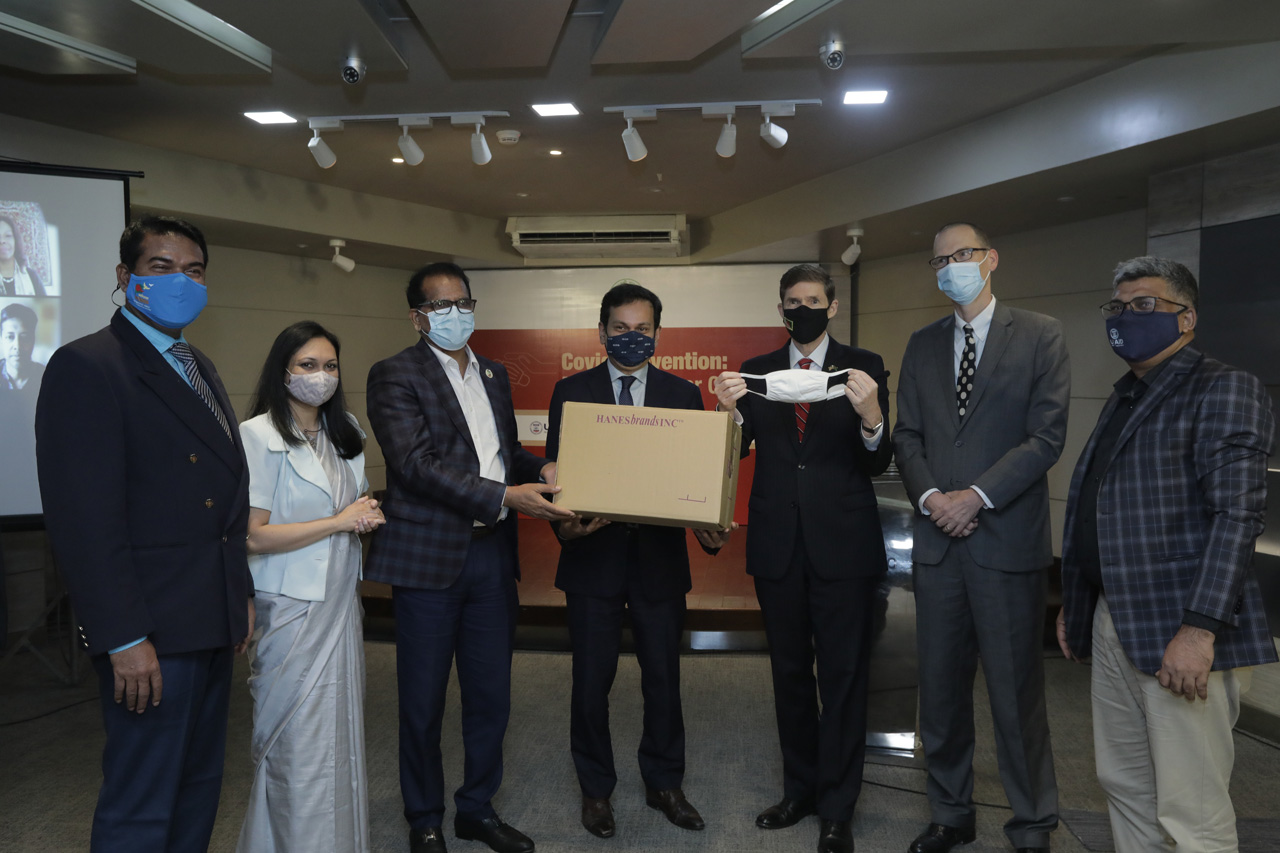
Distribution will be made among most vulnerable communities across country
As Bangladesh braces for a probable new wave of Covid-19, exacerbated by the Omicron variant, BRAC has received a bulk of 56 million three layered reusable cotton masks from Hanesbrands Inc., a US multinational corporation. The masks will be distributed among the most vulnerable people in all the 64 districts through community clinics.
Earl R Miller, US Ambassador to Bangladesh, formally handed over the masks to Asif Saleh, executive director of BRAC, at a ceremony at the BRAC Centre in the capital this evening (Thursday 06 January).
Lokman Hossain Miah, senior secretary to the Health Services Division, Ministry of Health and Family Welfare, attended the event as the chief guest with KM Tariqul Islam, director general, NGO Affairs Bureau, and Earl R Miller, US Ambassador to Bangladesh, being present as special guests.
US-based funding organisation the Open Society Foundation (OSF) and Yale University jointly coordinated the initiative to deliver the masks to BRAC.
Senior secretary Lokman Hossain Miah congratulated BRAC, Hanesbrands and other entities involved in this “great” initiative, and said, “There are two major ways to tackle transmission of Covid-19 at present. One is to ensure the wearing of masks by people including rickshaw-pullers, street vendors and day labourers who are constantly on the move for their livelihoods, and the other is vaccination. So it’s imperative that we make facemasks easily available to these people.”
US ambassador Earl R Miller at the ceremony said, “BRAC, the Government of Bangladesh, the American private sector and the US Embassy are working together to provide over 56 million masks to the Bangladeshi people donated by Hanesbrand, the American clothing company based in North Carolina. By heeding the lessons of science and history and through collaborative efforts like these, together, as a global community, we will defeat this pandemic.”
NGO Affairs Bureau director general KM Tariqul Islam said, “This bulk of masks will greatly help our vulnerable communities continue their fight against the pandemic. BRAC will distribute these masks across the country through the government’s community clinics network.
The BRAC executive director thanked the US government, Hanesbrands, Open Society Foundation (OSF) and Yale University for mobilising the donation and said, “Making masks available and accessible for all is crucial in the fight against Covid-19. We have seen significant success in mass vaccination in high-risk areas in Bangladesh, but additional preventive measures such as wearing masks are still vital. This donation will allow us to scale up our preventative efforts, and ensure that we can get free masks to the people who need them the most. We are extremely grateful to have support from multiple partners, which in addition to providing resources, provides us with encouragement that we are not in this fight alone.”
Opportunities to enhance youth employment in retail sector
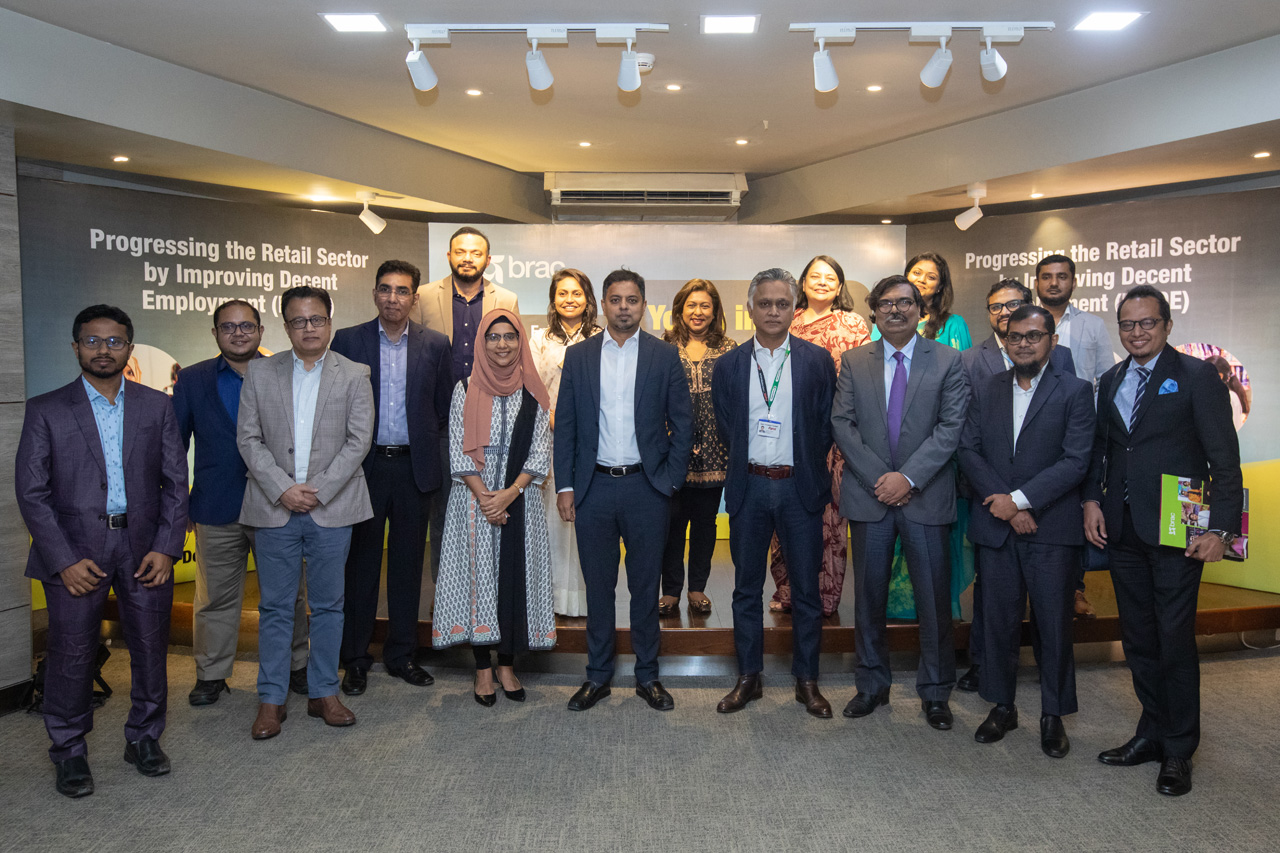
The retail sector of Bangladesh has already employed over six million (60 lakh) people. The sector has much growth potentials and will create employment opportunities for many more youths particularly women from the disadvantaged sections of the society in the coming years. Speakers came up with the observation while addressing a roundtable discussion on “Enhancing employment: Opportunities for youth in Bangladesh’s retail sector” organised in Dhaka today on Thursday.
The event, organised by BRAC’s Skills Development Programme (SDP) at the BRAC Centre this morning, aims to foster discussions with the private sector on youth employment in retail sales and skills training required for the jobs and advocate women and persons with disabilities inclusion in the retail industry.
Nihad Kabir, president, Metropolitan Chamber of Commerce and Industry (MCCI) was present as the chief guest at the event. Speakers at the roundtable, among others, were Tamara Abed, managing director of Aarong, BRAC, Syed Nasim Manzur, MD of Apex Footwear Ltd, Murtoza Zaman, chief executive officer of Unimart, Tanvir Sohel Khan, business director of Shwapno, Shaheen Khan, chief executive officer of Gemcon Food and Agricultural Products Ltd, Nure Alam Shimu, Managing Director of Gadget and Gear, M.M. Ferdous, Executive Director of Best Electronics, Mosaraf Hossain, Chief Operating Officer of Mirror Outfitters, Rubaiyath Sarwar, Managing Director of Innovision Consulting Ltd, Aziza Ahmed, head of operations of Bangladesh Business and Disability Network, Masudul Haq, MD of Amanah Group, Maria Huq, director of BRAC, Tasmiah Tabassum Rahman, Current in-charge, BRAC Skills Development Programme, and Joydeep Sinha Roy, Head of Operations, BRAC Skills Development Programme.
Considering the prospect of job creation in this sector, BRAC’s SDP is implementing a project titled “Progressing the retail sector by improving decent employment (PRIDE)”. The project aims to create a model for scale, providing sustainable livelihoods for low-income urban youths in Bangladesh in partnership with the retail sector and the Government of Bangladesh.
The retail sales project, funded by IKEA Foundation and UBS Optimus Foundation, aims to impact changes in the retail sector by providing decent work opportunities for disadvantaged urban youth, particularly women and persons with disabilities. It also supports industry standardisation in major cities like Dhaka, Khulna, Chattogram and Sylhet.
MCCI president Nihad Kabir in his chief guest’s speech said, “Women essentially need training to enter jobs in the retail sector. But at the moment training facilities for the aspirants are very limited. The government should focus on establishing these facilities.”
MD of Aarong Tamara Abed said, “It lies with us the employers to create decent work environment for both men and women at the workplace. There should be a continuous effort to make workplace environment more comfortable and healthy. There should also be sexual harassment prevention policies at place. Businesses should have separate washrooms and shift-based work schedule not only for women staff, but for the persons with disabilities also.”
Apex Footwear MD Syed Nasim Manzur observed, “It’s not only sufficient to organise training and employment in the retail sector, but quality improvement of the sector is also imperative. The government needs to play a decisive role in formulating necessary laws and giving recognition.”
Gemcon Food CEO Shaheen Khan said, “It’s a highly conventional idea that women cannot work as hard men. The women retailers in Bangladesh have proved their ability. We want more women in retailing. We have policy of inclusion in our business.”
Though the retail industry contributes significantly to Bangladesh’s Gross Domestic Product (GDP), opportunities for formal training hardly exists in the country for those looking for jobs in this sector. A baseline survey conducted in 2020 showed that a very low percentage of retailers provide formal training for their employees.
BRAC SDP, in collaboration with Bangladesh Technical Education Board has developed the country’s first accredited retail sales training module. Following this module SDP is currently providing training to those participating in its own training courses. Since the training began 54% of its participants are currently employed despite having no prior experience and the Covid-19 situation.
The retail industry in Bangladesh is male dominated with only 8% females. Retailers are reluctant to hire female staff citing safety issues and due to a pervasive perception that women cannot take physical strain. In the baseline survey, more than 50% of the respondent persons with disabilities stated they were not provided with specialised orientation although they had no previous work experience.
Retailers who did not hire persons with disabilities stated a number of reasons, the major ones among them are - the nature of business was not suitable, lack of accommodation at the workplace, and no applications received from aspirant persons with disabilities.
Tackling impact of Covid-19 on girls and young women Skills training in informal sector stressed

More than 50 million (5 crore) people involved in the country’s informal sector have borne the brunt of the Covid-19 pandemic. Women and adolescent girls engaged in this sector still suffered the worst of all. Participation in the labour market through effective skills training should be a high priority to assist them in recovering the situation. Speakers expressed these views at a discussion organised by BRAC’s Skills Development Programme (SDP) today on Thursday (2 December) at the BRAC Centre at Mohakhali in the capital.
K M Tarikul Islam, director-general, NGO Affairs Bureau, attended the event titled “Tackling Covid-19 adversities on girls and young women through skills training in the informal sector” as chief guest. Md Abul Kalam Azad, former principal coordinator (SDG affairs) at the Prime Minister’s Office was present as the special guest.
AFM Shahidur Rahman, director, Programme Development-Asia, PRL and Monitoring Department, BRAC, delivered the welcome speech, followed by a keynote presentation by Nobonita Chowdhury, director, Gender Justice & Diversity and Preventing Violence Against Women Initiative, BRAC, on the current state of girls and young women in the informal sector. Tasmiah Tabassum Rahman, in-charge, Skills Development Programme, BRAC, and Dr Narayan Chandra Das, senior research fellow, BRAC Institute of Governance and Development (BIGD), gave another presentation on “Skills interventions for mitigating risks on girls and young women - skills training for advancing resources (star), an apprenticeship-based skills training model”.
Veera Mendonca, deputy representative, UNICEF Bangladesh, Shahriar Islam, senior programme manager, Australian Department of Foreign Affairs and Trade, and Mirza Nurul Ghani Shovon honoured as Commercially Important Person status by the government, chairman, Informal Sector Industry Skills Council, spoke as panel speakers.
The speakers observed that the informal sector has been the worst affected in terms of the country’s labour market. The situation has its direct impact on the people involved in the sector, risking the livelihood of 52 million (5 crore 20 lakh) people. Women are the worst sufferer as nearly 91.8 per cent of total women labour force are engaged in informal economy.
A research carried out by BRAC last year (2020) revealed that regular earning dropped by 66 per cent for women involved in the informal sector, while their opportunities for work reduced by 24 per cent. Apart from these, the risk of dropping out of school has seen an alarming rise due to a prolonged shutdown of educational institutions and economic crisis, which has its inevitable adverse impact on other social situations.
Another study reveals that child marriage saw a staggering rise by 220 per cent between July and September last year. Experts mostly put down the causes to staying out of school and earning.
To recover from the crisis, BRAC puts particular emphasis on the re-engagement of women in the labour market and has accordingly designed its programmes and activities to fulfil that aim.
NGO Affairs Bureau director-general KM Tarikul Islam said, “All the organisations are working to fulfil the aim to have 10 million (1 crore) people employed in the Mujib Borsho (Birth Centenary of Mujib). The government has created a number of industries which will provide employment to women as well. But it’s a big challenge to tackle which the non-state development actors should come forward to assist the government.”
Former principal coordinator for SDG affairs at the PMO Md Abul Kalam Azad said, “In Bangladesh over 18 million (1.8 crore) women are employed in the labour market. We must also think what crisis these women may face in their livelihoods in case the Omicron variant of Corona virus spread in Bangladesh. We have to be adequately prepared to tackle the situation.”
In his closing remarks BRAC’s senior director KAM Morshed said, “It is a time when skills development should be a planned option. Many young people can choose skills development education instead of pursuing the path of conventional education.”
BRAC launches information website to support survivors of violence
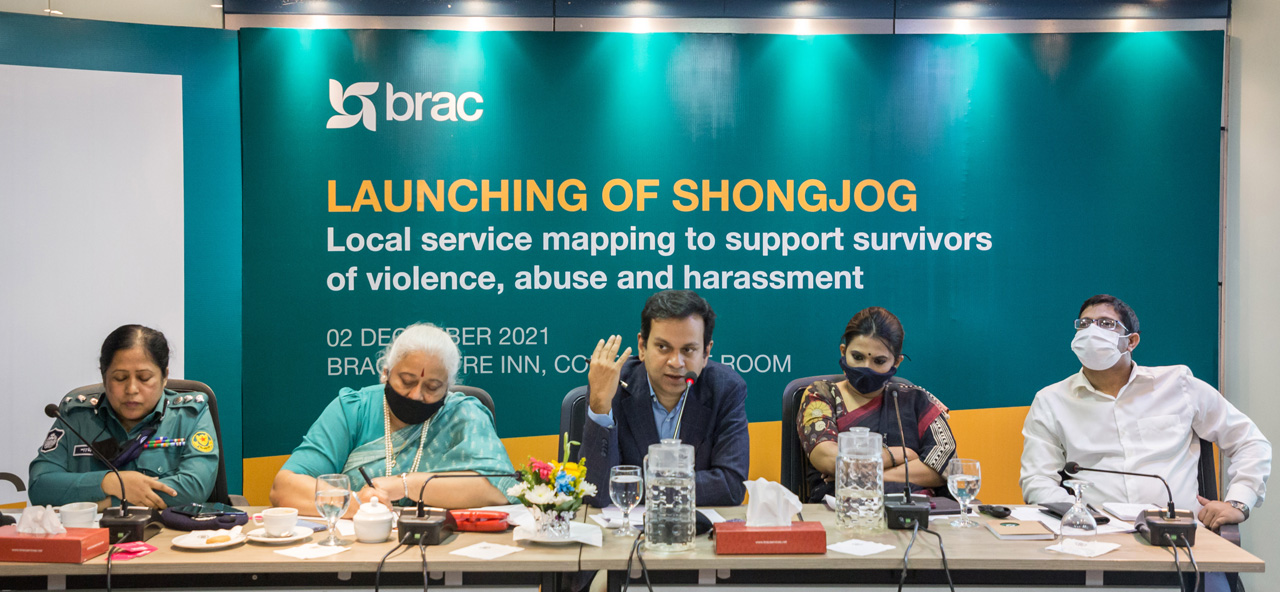
The local service mapping website titled “Shongjog” will offer information on medical, legal, psychosocial and other relevant local services.
BRAC has launched a specially designed database on a user-friendly local service mapping website called “Shongjog” to support survivors of violence to access eight types of necessary information and avail services from state and non-state actors.
The interactive tool that offers name, contact details and other information on service providing agencies was introduced for the public at an event held at the BRAC Centre on Thursday morning, 2 December 2021.
BRAC will offer information on eight types of services from this platform that has been developed based on a mapping conducted in 61 districts covering 435 upazilas across Bangladesh.
Aroma Dutta, member of parliament, and Md Habibur Rahman Chowdhury, deputy director, National Legal Aid Service Organisation (NLASO), attended the event as the chief guest and special guest respectively. Asif Saleh, executive director, and Jenefa Jabbar, director, Social Compliance and Safeguarding, BRAC, also spoke at the event.
The services in the mapping mainly include medical/health services, legal services, psychosocial services, safe/shelter homes, police stations and other necessary local service information for the survivors of violence. Through this website any victims/survivors of abuse, harassment and violence will be able to gain access to information and services designed to assist them to recover from traumatic experiences. It will result in an increased access to the system of government and non-governmental services, expected the organisers.
Appreciating this initiative, lawmaker Aroma Dutta called on all the civil society entities working on women’s rights to join the effort. She suggested BRAC should use the information on this website to develop a data bank to ensure more efficient support for survivors of violence.
NLASO deputy director Md Habibur Rahman Chowdhury assured that initiative will be taken to add details of all the government legal aid offices in different districts to this website. He emphasised the need to bring all the organisations working with survivors of violence under a single umbrella for success of this initiative.
BRAC executive director Asif Saleh said “This initiative will be truly successful only when people will get updated information from this site. But it’s not possible for BRAC only to entirely update it. It needs collaboration from all relevant stakeholders.” He urged all to not consider the website as an initiative solely of BRAC and to make their own contributions so that it becomes successful.
Jenefa Jabbar, director, Social Compliance and Safeguarding, BRAC, said her organisation will collaborate with the government and non-state actors at both the central and local levels to create a wider range of connectivity and referral linkage.
Taslima Yesmin, associate professor, Department. of Law at the University of Dhaka, and representatives from different organisations also attended the event. From BRAC, Tahmina Yesmin, safeguarding lead, Kollol Nag, Head of Platform under Technology Division, Taqbir Huda, advocacy lead for Communications and PVAW at Gender Justice and Diversity Programme, and Shashwatee Biplob, programme head, Social Empowerment and Legal Protection (SELP), were present, among others at the programme.
Change in social psyche must for disability inclusion

Ensuring rights and inclusion of the persons with disabilities is a formidable challenge towards achieving sustainable development. Tackling the challenge summons essential change in the pervasive negative social attitude and collaborative efforts from all including the government and non-governmental entities. Speakers expressed these views at a webinar organised by BRAC today on Tuesday.
The event was organised on the occasion of International Day of Persons with Disabilities (IDPD) to be observed on 3 December. Mahfuza Akhtar, secretary, Ministry of Social Welfare, attended the webinar as chief guest with Sheikh Rafiqul Islam, director general, Department of Social Services, attending as special guest. Asif Saleh, executive director, BRAC, Shafiqul Islam, country director, ADD International, Valerie Taylor, founder, CRP, Dr Morseda Chowdhury, and Maria Huq, directors, BRAC, spoke as panel speakers at the webinar. Rafe Sadnan Adel, head, Media and External Relations, BRAC, moderated the discussion.
The organisers said one-tenth of the country’s total population are persons with different kind of physical and mental disabilities. The overwhelming majority of these people are absent from the mainstream development scenario of the country, mainly owing to different inclusion related issues. Formulation and effective execution of disability-friendly policies are essential to promote inclusion of persons with disabilities in the mainstream development activities and build a sustainable future for them. All have to come together to make it possible.
Asif Saleh, executive director, BRAC, said, “Ideas such as persons with disabilities are people with very limited capacities, or they should not be given higher responsibilities, are very common in our society. We must break these ideas through exemplary development initiatives for persons with disabilities.” There is a lot of scope to work in this area, ensuring the equal rights of the persons with disabilities as the disadvantaged group of our society, he added.
The government is firmly committed to ensure the rights of and opportunities for the persons with disabilities, said Mahfuza Akhtar, secretary, Ministry of Social Welfare. The persons with disabilities need to be motivated about their potentials to become successful and at the same time the society has to change its conventional mindset. Although the government has promulgated laws and rules to safeguard their rights and formed committees in the districts and upazilas, it is, however, not possible for the government to do all that is needed. Collaborative initiatives from the government and the private sectors are essential to bring effective changes, the secretary observed.
Sheikh Rafiqul Islam, director general, Department of Social Services, called on the entrepreneurs, industrialists and private sector employers to provide jobs to the persons with disabilities, besides taking initiatives to create opportunities for them as well as undertaking rehabilitation and skills development initiatives.
ADD International country director Shafiqul Islam said, “The laws of Bangladesh safeguard the right of the persons with disabilities to access employment and safeguard them against discriminatory practices. The government is legally and politically committed to the cause, but it is not possible for the government alone to implement those rights. It needs coordinated and active participation from the persons with disabilities and the organisations that work with them.”
Having highlighted the exemplary successes of persons with disabilities in their jobs, CRP founder Valerie Taylor viewed that changes are happening now. “But the changes need to be speedier and it would be great if we all can be stakeholders to bring the change.”
BRAC Human Resource Division director Maria Huq mentioned a range of measures undertaken by BRAC to establish a disability-friendly workplace, and said the organisation has set a target to appoint 900 persons with disabilities as its staff by 2025.
BRAC Health, Nutrition and Population Programme director Dr Morseda Chowdhury observed that initiatives to give soft skills training to persons with disabilities are still few in Bangladesh. Having stressed that measures should be taken for both soft and hard skills training for them, she called on all to take collaborative efforts to ensure equal opportunities for and dignity of the persons with disabilities at the workplace.
BRAC, H&M Foundation and The Asia Foundation launch the Global Innovation Challenge inviting RMG-based solutions
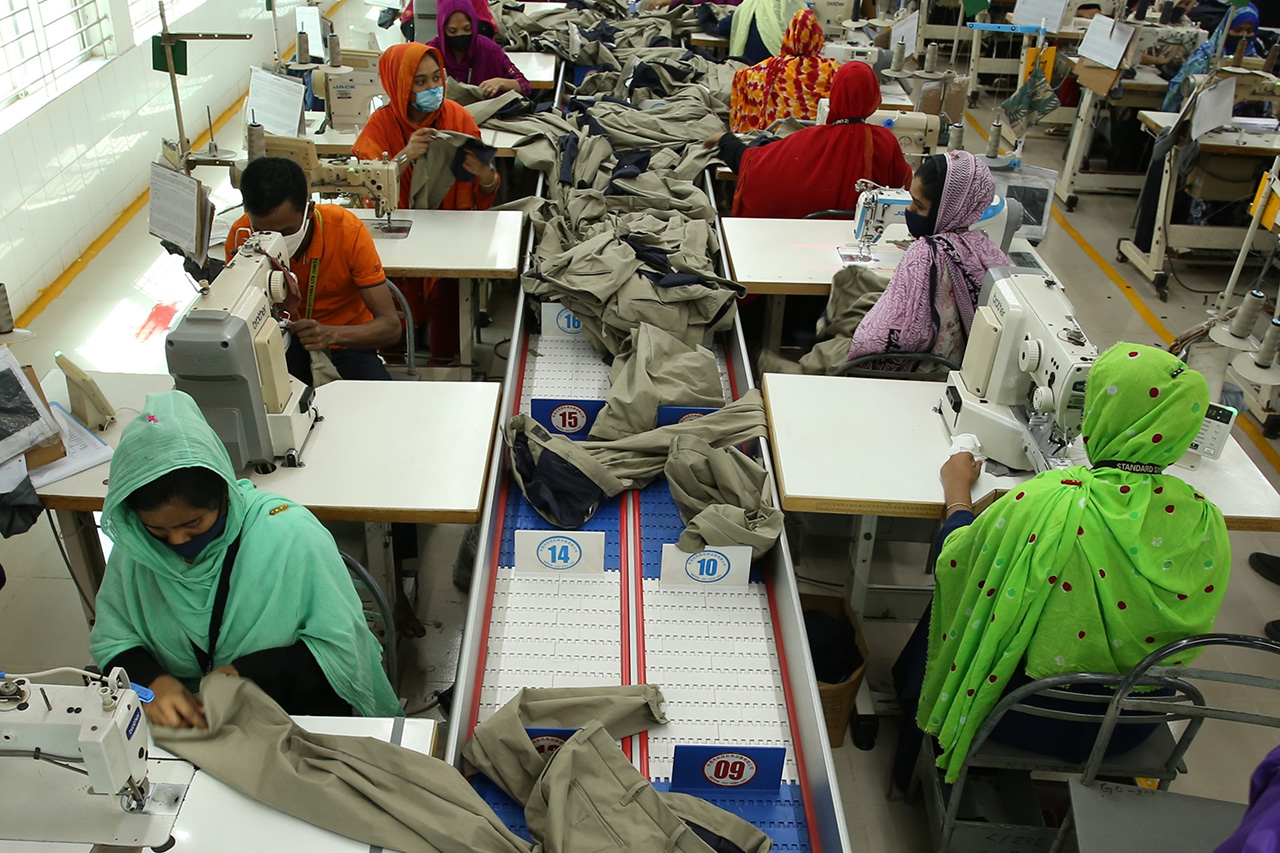
Six winners to receive a fund up to $30,000 and incubation support for pilot implementation.
SITICH for RMG, a pilot project undertaken by BRAC Social Innovation Lab, H&M Foundation and The Asia Foundation, has launched the international virtual competition to find solutions for safeguarding the women in RMG in Bangladesh and increase the competitiveness of factories. Innovators from around the world are welcome to submit viable solutions incorporating these key issues. Applications are now open and to be submitted by 25 November 2021.
Entrepreneurs can submit ideas under five thematic areas – Automation and Efficiency; Sustainability and Circular Fashion; Product Design, Diversification, and Raw Material; Skill Development and Women’s Career; and, Enabling Environment. The themes have been identified through many dialogues centering the STITCH for RMG: Global Innovation Conference in June 2021 that brought together over 450 RMG buyers, suppliers, industry experts, and tech innovators.
“Defining the problem is 90% of the solution. We need to reach the experts, those who already are working with workable solutions, seek their help and guidance then scale up the solution-oriented prototypes through hackathons.” – K A M Morshed, Senior Director, Advocacy for Social Change, Migration, Partnership Strengthening Unit, Social Innovation Lab, Technology, BRAC.
The competition is free to participate and welcomes ideas as well as innovations in ready prototype, pre-commercial, and post-commercial stages. Three rounds viz. the Concept Round, Pitching Round & Marketplace Round will entice written application, virtual pitching through video submission, and interaction with RMG suppliers for joint submission of Expression of Interests (EOIs). Winning six ideas will move on to the pilot execution and incubation phase. Interested innovators have to form a team of 2-3 members and submit their ideas through brac.us.skipsolabs.com/en/login/page.
“There is a real need for new approaches to support women in the future garment industry. We have high hopes that the STITCH for RMG Global Innovation Challenge will result in innovations that have the potential to improve the industry competitiveness and livelihood of the women garment workers. Our long-term goal here is to prepare and equip the women to work successfully alongside AI and automation, and by this safeguard their livelihoods” says Charlotte Brunnström, Strategy Lead at H&M Foundation.
Learn more about the Global Innovation Challenge at stitchforrmg.brac.net/innovation-challenge.
‘Safe Back to School’ campaign
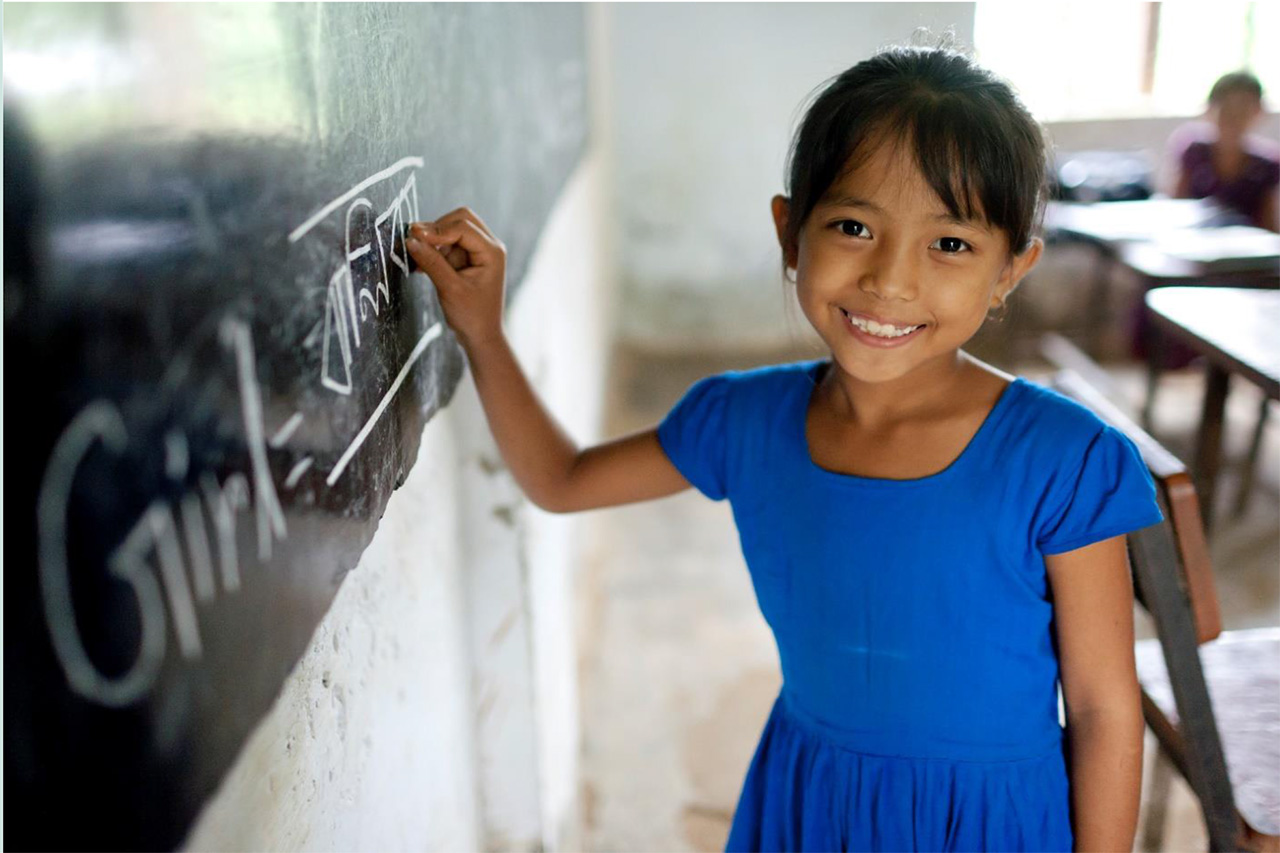
Joint campaign of nineteen development partners on children safety cover more than 10 thousand schools
The ‘Safe Back to School’ alliance is running a campaign with the government to raise awareness on behavioural change among children, ensuring that they comply with Covid-19 health advisories in schools.
Besides the countrywide awareness campaign using messaging through different channels, the alliance members are also implementing diverse activities in more than 10 thousand schools across 56 districts to promote behavioural change in children to help them grow habits to follow the Covid-19 precautions.
The government and its stakeholders took children safety as their top priority before the educational institutions were re-opened on September 12 to make sure that children return to and continue school with all kinds of protection against Covid-19. To drive the effort 19 national and international development organisations launched ‘Safe Back to School’ campaign on 10 February this year.
Alongside the government, the campaign is leveraging all the available mediums of communication to create countrywide awareness to ensure safe return and safe learning environment for children in schools. The implementing partners today, Tuesday, briefed the current activities and future plan of the campaign at a press conference at the National Press Club in Dhaka.
BRAC’s senior director KAM Morshed, on behalf of the implementing partners, told the press conference that the campaign has been particularly designed to disseminate messages to all children and their families through all possible communication channels. “We are using all the available mediums of communication – mass media, social media and word of mouth. These messages are promoting behaviour change in children to help them adopt the Covid-19 precautions of handwashing, mask wearing, social distancing as habits,” said KAM Morshed.
Communications manager at World Vision Bangladesh Devashish Ranjan Sarker moderated the event, while Save the Children in Bangladesh senior manager (media and communications) Nusrat Amin briefed on the different contents developed under the campaign. The contents, among others, include an audio-visual advertisement by popular band group Joler Gaan themed on awareness messaging for children to be aired soon on television channels and social media.
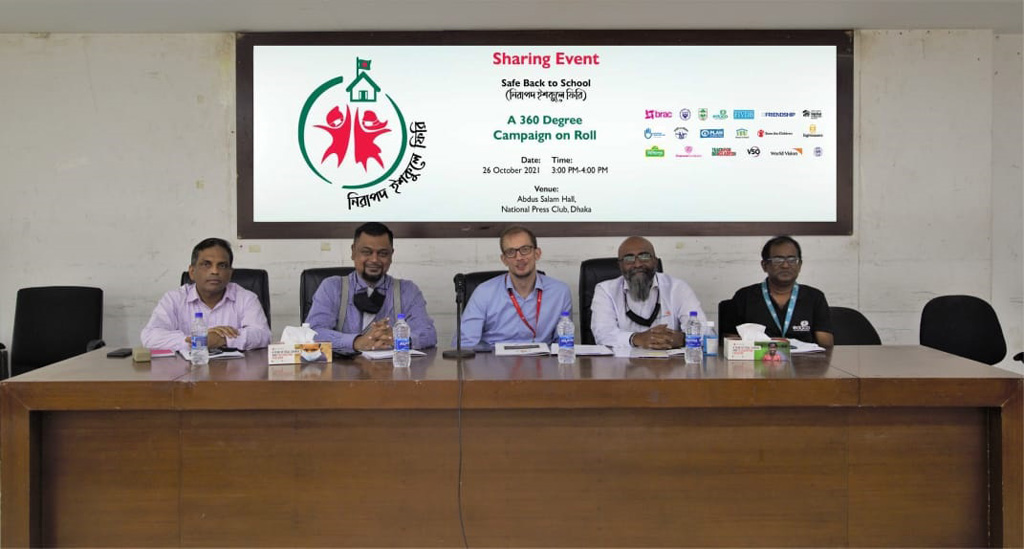
Country Coordinator of Stromme Foundation Mizanur Rahman said the alliance is working as a catalyst to make a bridge between the government and the marginalized people so that the demands of marginalized reaches the government and the messages by the government reaches the masses properly.
Coordinated initiative and planning between the government, non-government organisations and the mass media is required to get those children back to regular schooling, who are left behind due to family or social situations or financial constraints, said Golam Kibria, head of education at Educo Bangladesh.
Save the Children in Bangladesh country director Onno Van Manen requested mass media to highlight different contents on the need for importance of education to encourage children to return to school to recover last one year and a half’s Covid-19 induced learning loss.
Tony Michael Gomes, director (Communications, Advocacy) at World Vision Bangladesh, said all the alliance members working in the field of education is making sure that the available resource are mobilised to keep the schools safe.
Samia Ahmed, senior manager (advocacy and campaign) at Save the Children in Bangladesh, and Rafe Sadnan Adel, head of media and external relations at BRAC was also present at the programme.
Alongside the awareness campaign, the alliance members are also implementing diverse activities with special focus on the schools in remote areas. These activities include Covid-19 safety training for teachers of remote schools; distribution of masks, hand wash and education materials, thermal detector at schools; advice on keeping schools clean; assistance to children of families in extreme poverty to get back to school; advocacy with school management committee and community leaders on school safety; and door-to-door campaign and courtyard meetings with guardians to send children to school.
The organisations running the campaign are - BRAC, Campaign for Popular Education, Dhaka Ahsania Mission, Educo Bangladesh, FIVDB, Friendship, Habitat for Humanity Bangladesh, Handicap International – Humanity & Inclusion, Jagoroni Chakra Foundation, Plan International Bangladesh, Room to Read Bangladesh, Save the Children in Bangladesh, Sightsavers Bangladesh, Sesame Workshop Bangladesh, Stromme Foundation, Teach for Bangladesh, VSO, World Vision Bangladesh and YPSA.
BRAC survey: 72pc of youths use internet, with only 28pc looking for technical and vocational education
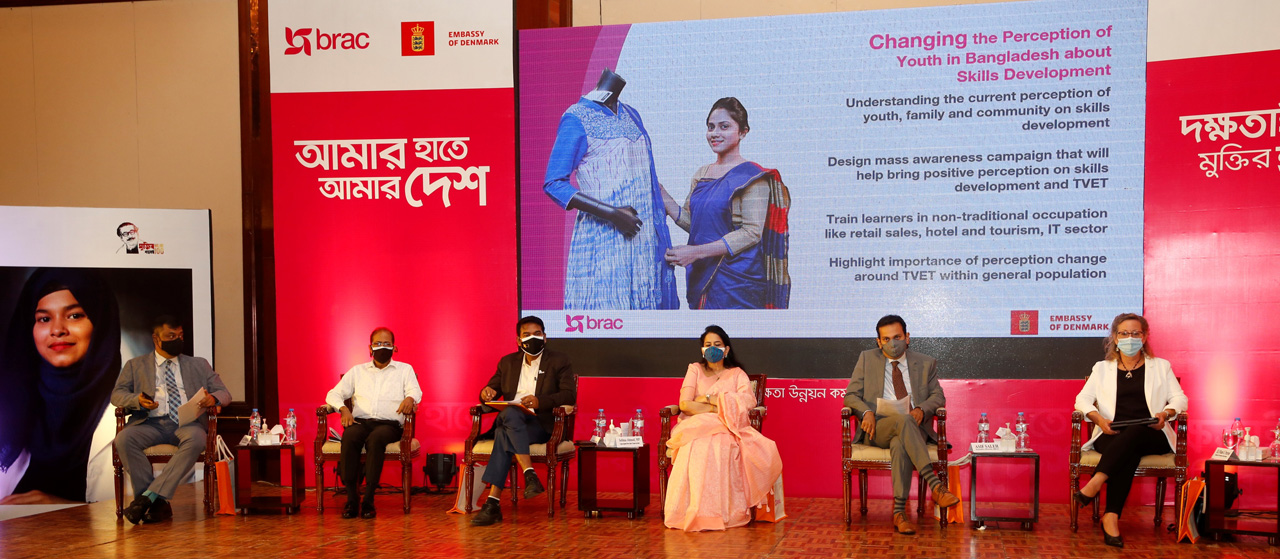
Among the youths of Bangladesh, 86 per cent have access to smartphones, overall 72 percent use the internet, while 28.3 percent have recently searched for materials and training related information on technical and vocational education and training (TVET).
A baseline survey on the youth perception about skills development training and post-training employment recently conducted by BRAC reveals this picture. Most (65 per cent) of the young people who have participated as respondents in the survey, identified facebook as the most effective digital platform for raising public awareness TVET.
This information and observations came at a national-level exchange-of-view event titled “Changing perspectives of youths regarding vocational education in Bangladesh” organised by BRAC today on Thursday (9 September).
KM Tariqul Islam, director general (Grade-1), NGO Affairs Bureau under the Prime Minister’s Office, Dulal Krishna Saha, executive chairman (secretary), National Skills Development Authority (NSDA), and Selima Ahmad, lawmaker and president, Bangladesh Women Chamber of Commerce & Industry (BWCCI), attended the event as special guests, arranged at a hotel in the capital.
Winnie Estrup Petersen, ambassador of Denmark to Bangladesh, spoke at the event as the guest of honour. Chaired by Asif Saleh, executive director, BRAC, the event was also attended by a number of high officials from government and non-governmental agencies.
Guests present at the event dwelt on the issue of employment generation and achieving economic prosperity through transforming the people, particularly the youths of this country into effective human resources through TVET and other kinds of skills development.
In his welcome speech, KAM Morshed, senior director, BRAC, said, stigma is associated with skills and vocational training in the society and we must partner with communities at large and fight together against this.
While presenting the keynote speech, Tasmiah Tabassum Rahman, current in-charge of BRAC Skills Development Programme, said jobs related to technical and vocational education in Bangladesh are still considered as blue collar jobs, and this is why it is very important to create awareness and tell the society about the importance of TVET and its prospects.
Speakers at the programme pointed out that despite the government has undertaken a number of measures to popularise TVET, the public perception has yet to change sufficiently in Bangladesh. Non-governmental organisations can play an important role, complementing the government efforts, in effectively changing perceptions at the community level, including in the communities living in the hard-to-reach areas. The NGO Affairs Bureau, as the regulatory body and as the custodian of the NGOs working in Bangladesh, can guide those organisations that are particularly registered for working in the skills development sector in playing a more effective role in raising public awareness. The Bureau can also work for widening the scope for Go-NGO collaboration in the sector.
NGO Affairs Bureau DG KM Tariqul Islam said, “Despite there are government run training centres in all the districts, bringing change in mindset should be the first task. Here the private and voluntary organisations have a role to play. This BRAC survey report (presented at the event) will be helpful for the government and other private sector organisations in offering training programmes. We expect that private sector stakeholders will build infrastructures and provide training to youths in the areas where the government training centres do not have wide coverage of services.”
NSDA executive chairman Dulal Krishna Saha said, “We have to maintain the productivity of our labour force to maintain the growth we have achieved in different sectors. Without skills we won’t be able to sustain ourselves in the fourth industrial revolution. We do, therefore, need an intensive awareness campaign both to attract foreign investment and build a vast pool of skilled manpower.”
Winnie Estrup Petersen, ambassador of Denmark to Bangladesh, said “We need to listen to the young voices and enter into a dialogue with them under an inclusive approach. Stakeholders form the public private sector and partners need to think about how to change the mindsets of young people. This can be done through adequate campaigns and ultimately the youths need to be prepared with the right skills and right mindset for the changing world.”
BWCCI president Selima Ahmad said “Providing training to the young population is not enough, we also need to create work opportunities for them as well. It needs a media campaign, engaging community leaders and public representatives so that they can encourage their communities to take technical and vocational training. Also, organisations like BRAC can introduce programmes on public awareness and training in areas with higher trends of manpower export.”
In his concluding remarks BRAC executive director Asif Saleh said, “It’s never enough to erect only the buildings of training centres. We have to focus on the training itself so that by utilising that skills training they can secure jobs for themselves, or become entrepreneurs, or can engage in income generating activities and improve their living standard eventually. We need to change the role of how we approach skills development and youth employment. We are ready to support the Bangladesh government and scale up new innovative solutions for TVET.”
While carrying out its different initiatives BRAC’s Skills Development Programme (SDP) came to realise that skills development of the mass of young people will open the door to an infinite opportunity for realising their potential leading to the country’s robust socio-economic development.
In this context BRAC SDP has undertaken this pilot project with funding from the Danish Embassy to increase people’s awareness and knowledge about the importance of TVET and the resulting potential employment opportunities. The pilot is under implementation in three divisions, namely Dhaka, Chattagram and Sylhet.
As part of the pilot, a baseline survey was conducted to know about the perception of young people regarding skills training and employment, an excerpt of which is below.
- The respondents believe that the most important reason for choosing TVET is to get jobs soon as possible. Of the respondents 43.7% said the idea of such training just did not occur to them.
- Women should have more opportunities for taking TVET particularly in the unconventional occupations such as light engineering and mechanical and other kinds of repair work.
- Of the respondents, 65% identified facebook as the most effective digital platform to raise awareness on TVET.
Study: click here.
Join the world’s biggest family

